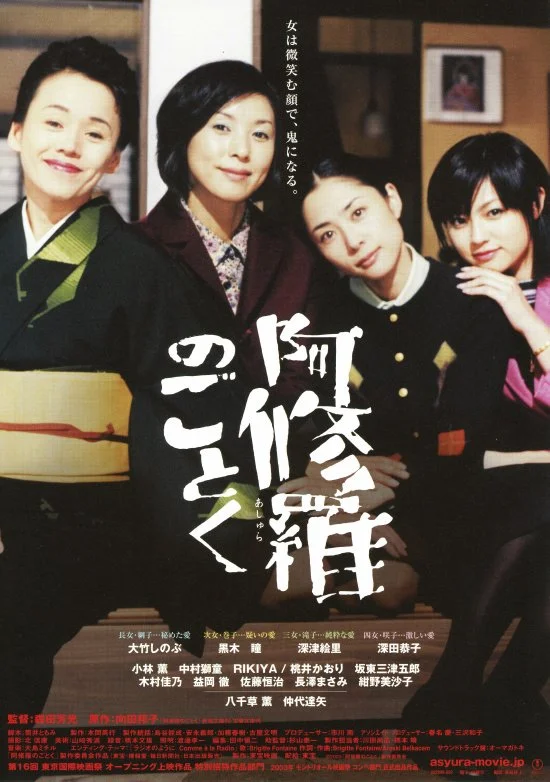LIKE ASURA (Japan, 2003)
Directed by: Yoshimitsu Morita
Starring: Shinobu Otake, Hitomi Kuroki, Kyoko Fukada, Eri Fukatsu
“Warm, witty and well-observed…recalls recent works by another onetime provocateur, Pedro Almodovar…”
- Derek Elley, Variety
2003 Japanese Academy Awards
Winner – Oustanding Performance by an Actress in a Supporting Role – Eri Fukatsu
Winner – Director of the Year – Yoshimitsu Morita
Winner – Screenplay of the Year
The first Japanese film to open the prestigious Tokyo International Film Festival in eleven years, LIKE ASURA is a movie that deserves far more attention in the West. Based on an infamous novel, which spawned a shocking, sexually frank TV series in 1979, it’s a rich, comic portrait of a year in the lives of four sisters. The oldest, Tsunako, is widowed, and in her early forties. The next-youngest is the not-so-happily married Makiko. The typical middle child (hyper, critical, desperate for attention, socially-stunted), Takiko is a stereotypical librarian, and the youngest, Sakiko, is living in sin with her boxer boyfriend.
The sisters are summoned to a crisis conference when Takiko discovers that their father may be having an affair. Their varying reactions (from hysteria to “live and let live”) peg their characters to a “t”, and audiences settle in for an “I’ve seen this before,” snooze. But that’s exactly when the movie takes a turn and spends its remaining hundred and twenty minutes tearing down our preconceived notions. Set in 1979, with impeccable technical credits and precision comic acting, LIKE ASURA manages to make the Takezawa sisters complicated and contradictory; easy to criticize, but instantly-identifiable; fatally-flawed, but deeply sympathetic – in other words, they feel like real sisters. And that’s what this sprawling comic confection is all about: family.
Named after the Hindu goddess, Asura, whose placid face belies her hunger for discord and chaos, this flick is a distinct change of pace for the director, Yoshimitsu Morita, who’s best known for his extreme satires like 1983’s Family Game. Here he turns out a highly-popular, well-polished movie that wants to do nothing more than entertain a mainstream crowd. It’s exactly the kind of good, non-shocking, non-violent movie that most American film festivals stay away from, but it’s also exactly the kind of adult movie that US audiences may be the hungriest to consume.
